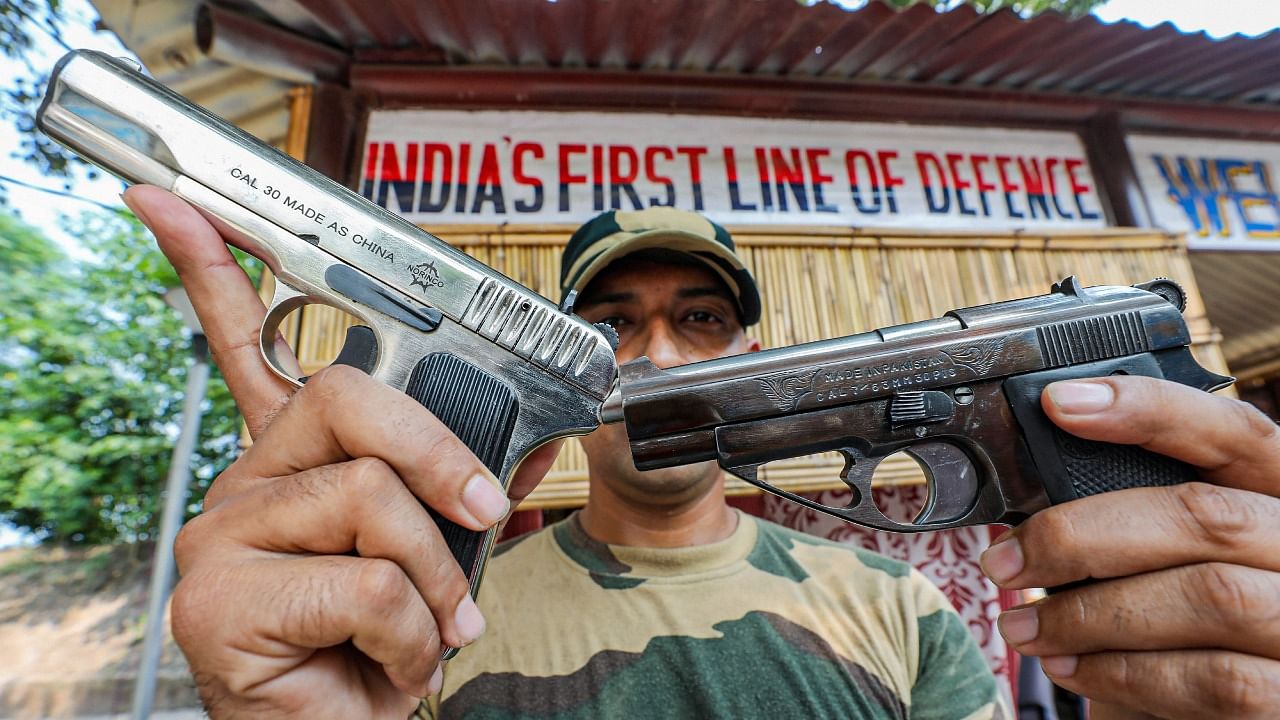
Several recent instances in the country, Delhi's Jahangirpuri being the most recent, have shown groups of people sporting weapons, taking to streets, displaying barbaric acts in the name of religion.
The recent Jahangipuri incident, that broke out on Saturday, saw 9 people get injured in the violent clash. The police even detained one, on the grounds of opening fire during the clash. Many such instances of communal violence have been reported in the country recently, during processions on behalf of Ram Navami and Hanuman Jayanti.
Though political leaders defend this, stating it as an 'act of self-defense', carrying guns, or any kinds of arms for procession is prohibited, legally speaking.
What is the Indian Arms Act?
The Indian Arms act was passed back in 1959, to control matters such as acquisition, possession, sale, purchase, manufacturing, transportation, import and export, licensing of arms and ammunition. According to a 2016 census, approximately 5 per 100 civilians in the country own firearms- making India 120th most armed country. The data also suggests that Uttar Pradesh has over 12 lakh active firearm licences.
An IMHE data from 2016 also showed that India, with 26,500 deaths, ranked 3rd in most number of firearm related deaths, just behind United States and Brazil.
According to the Arms Act, carrying weapons is punishable with jail term and a fine. Firearms or weaponry can only be possessed after acquiring a licence issued by the concerned district authorities. The Act also states that sharp objects, such as knifes and swords, over nine inches in length, too require a licence.
The Arms Act was further amended in 2016, stated that persons applying for arms licence are required to undergo arms and ammunition safety training courses, which includes having a basic knowledge of arms and ammunition, safe handling, techniques etc., Following which, the concerned authorities can issue the licence within 60 days.
An additional 2019 amendment, further sought to reduce the number of licenced firearms that a person can possess. It also proposed strict punishment for possession of illegal firearms as well as for those indulging in heedless acts of gunfire, which may endanger the life of others. Such acts will be met with a two year imprisonment or a fine of Rs 1 lakh, or may be both. The bill also tendered life imprisonment for making illegal firearms.
Who can acquire a gun in India?
According to the 1959 Act, firearms are categorised into two as- Prohibited Bore (PB) and Non Prohibited Bore (NPB). The bore refers to the diameter of the bullet.
According to Chapters II and III of the Act, all civillians can apply for possession of NPBs, which includes guns of caliber .35, .32, .22 and .380.
Prohibited Bore weapons include pistols (9 mm) and handguns of caliber .38, .455 and caliber .303 rifles, as well as automatic and semi-automatic guns. While NPBs can be possessed by any civilian, PBs are usually issued to defence personnel. Prohibited Bores are also issued to people who are facing imminent threats, or live in terrorist-prone areas as well.
How to acquire a gun licence in India?
In India, guns are only issued for three purposes- self-defense, crop protection and sports, where sufficient proof is required the former. In order to acquire a gun licence, one needs to be above the age of 21. The first step includes filling up an application form, which includes queries regarding the person's past criminal behaviour. Information such as identity proof, residence proof, age proof, proof of education, residence proof, 4 photographs, last three years’ income tax returns are also required to be submitted.
The next step includes a background check of the applicant by the police, where the applicant as well as his family are interviewed.
Once the application gets approved, the person is required to undergo arms training, following which the licence in obtained. The licence has to be renewed every 3 years as well.
Though India boasts of extremely stringent gun laws, some exceptions have also been given to certain communities. Kodavas, an ethnolinguistic group from Coorg in Karnataka are allowed to carry guns without licence as it is seen as part of their culture; with similiar laws regarding possession of Kirpan by Sikhs.
Watch the latest DH Videos here: